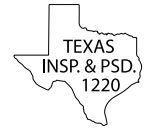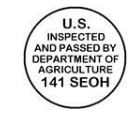Question: When can I sell meat to customers across state lines? Are there different rules if the sales take place on the internet?

Photo via Bell Road Beef, Clayton, New Mexico
Answer: For Texas producers (and those in most other states as well), only meat processed at a federally inspected facility may be sold to customers in another state. This is true for both in person and internet sales.
Analysis: Let’s look at the applicable rules. (Do note that here, we are focusing on “amenable animals,” which include cattle, sheep, goats, and swine. For “non-amenable animals,” such as bison, water buffalo, deer, elk, and others, there are different statutes and rules that apply. There are separate regulations for poultry, which we will not touch on here.)
Here is a basic overview of the different types of facilities.
Federally Inspected

A federally inspected facility is inspected by employees of the United States Department of Agriculture Food Safety and Inspection Service. The federal inspector must be present at all times when the plant is in operation. The facility must follow all federal requirements, including applicable food safety standards. Products from a federally inspected facility will receive a federal inspection stamp, which allows them to be sold in interstate commerce. For producers looking to sell outside the state where their product is slaughtered and processed, a federally inspected facility must be used. To find federally inspected facilities, click here.
State Inspected

Some states offer a state-level meat inspection program. To do so, states enter into an agreement with FSIS to create a state meat and poultry inspection (MPI) program. States develop their own standards, which must be at least equal to the federal standards. Currently, 29 states have a state-level meat inspection program, including Texas. To see a list, click here. For state inspected facilities, a state inspector must always be present when the plant is operational. In Texas, this is an inspector from the Department of State Health Services. Meat processed at a state inspected facility will receive a state stamp of inspection and may be sold only in intrastate commerce, meaning they may only be sold in the state where the slaughter and processing occurs. To locate state inspected facilities in Texas, click here.
Talmadge-Aiken
A “Talmadge-Aiken” facility is a facility operated under the Federal-State Cooperative Inspection Program. These facilities are subject to federal inspection standards, but the inspections are conducted by state inspectors, rather than by FSIS employees. These facilities must follow all federal requirements. As one inspector explained it, “the only difference is who puts on the white jacket in the morning.” Product from these plants will receive a federal stamp of inspection and, therefore, may be sold in interstate commerce. In Texas, there are currently no Talmadge-Aiken slaughter facilities, but there are a few Talmadge-Aiken processing facilities. To locate these facilities, click here.
Custom Exempt

A custom exempt facility is exempt from both federal and state inspection and is not required to comply with certain FSIS regulations. There is no requirement of an inspector being present at all times during operation like an inspected plant. Instead, only periodic inspections are conducted. Importantly, there are still many requirements related to sanitation, humane slaughter, and recordkeeping with which custom plants must still comply.
Critically, meat slaughtered and processed in a custom exempt facility may not be sold or donated. All meat from a custom exempt facility will be labeled “not for sale.” The only allowable uses of meat from these facilities are by: (1) the owner of the livestock; (2) members of the owner’s household; (3) non-paying household guests; and (4) household employees. Essentially, FSIS views custom exempt facilities as providing a service for the livestock owner rather than producing a commercial product.
How, then, do some direct beef sellers utilize custom exempt facilities? Instead of selling the meat after slaughter, the producer can sell the live animal to the consumer prior to slaughter. After that sale transaction occurs, the producer then delivers the live animal to the slaughter facility. The new owner (consumer) pays for the slaughter and processing services. Because the meat is being slaughtered and processed for the owner of the animal, a custom exempt facility can be used. Do note that prior to arrival at the facility, ownership of the entire animal must be accounted for. For example, if I want to sell quarters of a steer, I must have 4 buyers identified to list as the owner of the animal at the facility.
I recommend producers engaging in this type of transaction enter into a custom harvest agreement with their consumers. Read more about that here.
Cooperative Interstate Shipment Program

One relatively new option in certain states is the USDA Cooperative Interstate Shipment (CIS) Program. This program allows certain state-inspected plants to operate as federally inspected facilities if they meet certain conditions. The key benefit to qualifying plants is that products receive a federal stamp (with a state establishment notation) and may be sold in interstate commerce.
The CIS Program is available to the 29 states that have established a state meat inspection program. Of those, there are currently only 10 states participating in this program. Importantly, Texas is not a participant in the CIS Program. To see a complete list, click here.
For state inspected plants in states participating in the CIS program, the following requirements must be met to qualify for the program: (1) plant has 25 or fewer employees; (2) plant has an adequate food safety program; and (3) plant meets appropriate facility standards (including a number of federal requirements). For more information, click here.
Conclusion: For Texas producers, meat must be slaughtered and processed at a federally inspected facility in order to be sold to consumers in other states. For more information on legal and economic issues related to direct beef sales, check out our direct beef sales handbook and our upcoming direct beef sales programs in Conroe on May 8 and Decatur September 13.











